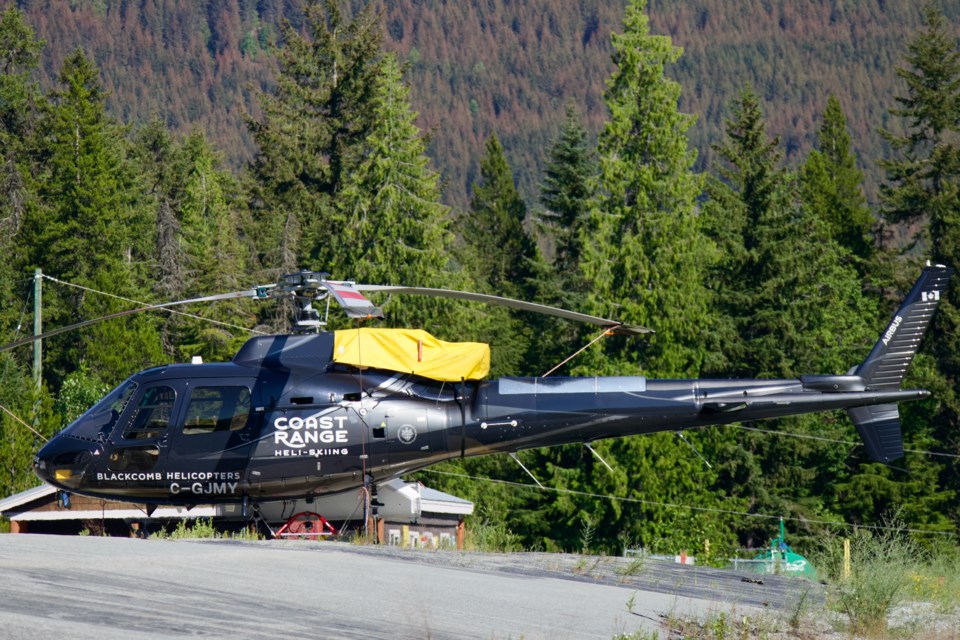Management of Whistler’s heliport will soon shift to the Resort Municipality of Whistler (RMOW), marking the end of a 30-year run by the Whistler Heliport Society (WHS).
Located north of Green Lake, the facility has been operated independently by the WHS since the early 1990s. But in 2023, the society informed the municipality it could “no longer manage the facility effectively,” according to a staff report presented to council on July 8.
To ensure continued operation, the RMOW has signed a management services agreement with a contractor to oversee daily heliport operations and ensure compliance with Transport Canada regulations, said Erin Marriner, the RMOW’s legislative services special projects coordinator.
A brief history included in the municipal report notes the heliport was ready for landings by 1991, featuring a central public pad and five leased areas. Over the years, it has supported heli-skiing, medical evacuations and sightseeing flights. Ahead of the 2010 Winter Olympics, the facility expanded to include a sixth lease area for the Canadian Armed Forces.
Throughout this time, the RMOW held the provincial land lease, while the WHS managed day-to-day operations under a sublease. That lease has since expired and is currently operating on a month-to-month basis while the RMOW negotiates a new agreement with the province.
The WHS was composed of representatives from local helicopter companies with a vested interest in leasing space at the facility.
Blackcomb Helicopters, Whistler Heli-Ski and Coast to Coast Holdings Ltd. are the current heliport tenants.
The heliport was originally established in response to safety concerns in the 1980s, when private helicopters frequently landed near residential areas. Noise complaints and proximity to homes prompted the municipality to seek provincial and federal funding for a dedicated public landing pad at the north end of town.
Going forward, the RMOW has contracted a third-party operator to manage the site. Their responsibilities include collecting landing and overnight parking fees, conducting maintenance, ensuring regulatory compliance, submitting reports, meeting with elected officials, and planning upgrades.
Landing fees will vary by helicopter weight: $70 for light, $90 for medium, and $130 for heavy helicopters. Overnight parking—by advance booking only—will cost $100. Emergency landings and those by leaseholders are exempt from fees.
“Our proposed rates fall somewhat above the average for some small towns and cities, but remain below what's charged at airports like Vancouver and Victoria,” said Marriner.
The new fees are expected to be roughly double what the WHS previously charged, according to the staff report, which estimates annual gross revenue of $15,000 to $20,000. The increase reflects the cost of maintaining the facility and bringing rates in line with current market conditions.
Councillor Jeff Murl questioned why the WHS had stepped away from its longtime management role, especially considering the financial benefits leaseholders once enjoyed.
“It seems like the leaseholders, given the fees have doubled, are giving up a sweet deal to monitor themselves. How come they couldn't get it together and carry on as it was?” he asked.
Marriner said she had not investigated the full history, but suspected the WHS recognized they would incur higher costs under a new agreement covering both leased and itinerant use of the heliport.
Coun. Cathy Jewett raised concerns about helicopters landing in residential neighbourhoods, referencing two landings she had witnessed by a chopper. The heliport was initially developed to curb such activity, but staff were unable to confirm which regulations govern residential landings.
Due to its independent nature, little public information exists about WHS operations. However, the group made headlines in 2018 when it filed a civil suit against Coast to Coast Holdings Ltd. and its owner-operator. WHS alleged the company used the heliport without a valid lease or membership. In response, Coast to Coast argued its owner, Denis Vincent, was also an operator of Spearhead Aviation, which did hold a lease.
A judge later granted an injunction permitting Spearhead to continue using the Whistler Municipal Heliport.
A new webpage on the RMOW website will soon provide heliport details for itinerant users.




